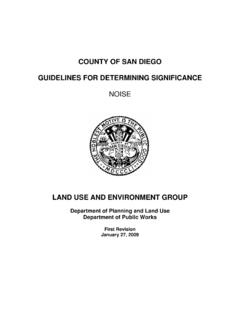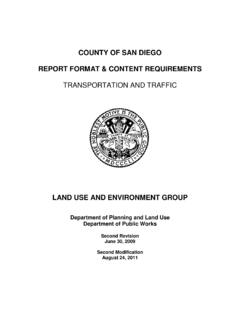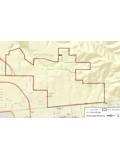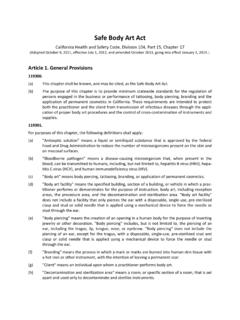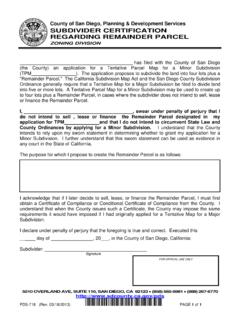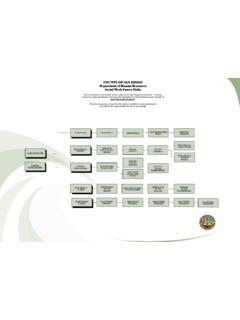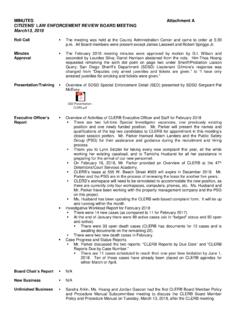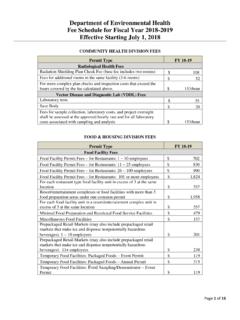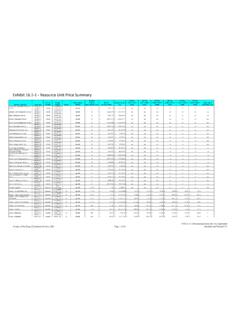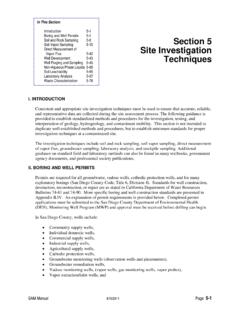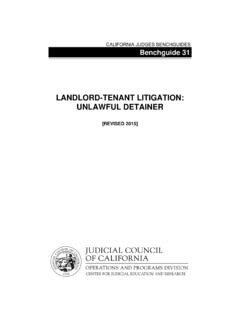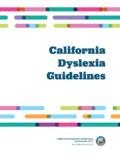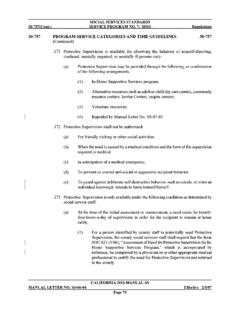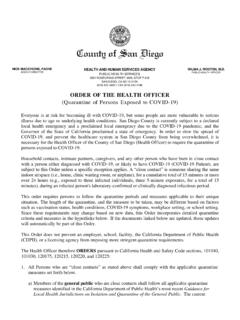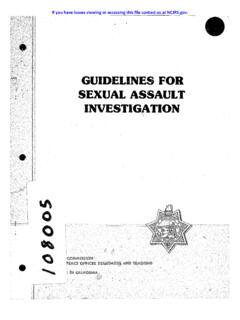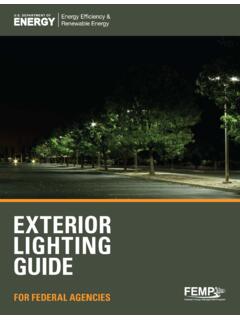Transcription of Temporary Lodging Resources - San Diego County, California
1 Temporary Lodging Resources 1. How do we access Temporary Lodging Resources ? Please refer to the Temporary Lodging Letter and the Temporary Lodging Process. The questions to follow address those specific to Project Room Key (public health and high-risk hotel/motel rooms and the Convention Center). 2. What is the purpose of the Project Room Key hotel rooms? And, what is the criteria to be placed in a hotel room? Project Room Key hotel rooms are Temporary Lodging made available to address the COVID-19 public health pandemic and support isolation, quarantine, recovery, and prevention efforts.
2 The hotel rooms are not intended to solve the unsheltered homelessness crisis in San Diego . The COVID-19 pandemic is layered atop an affordable housing shortage and a homelessness crisis. The eligibility criteria are based on FEMA reimbursement guidelines for non-congregate sheltering and guidance from public health officials. These guidelines include the type of non-congregate sheltering (hotels/motels, dormitories, etc.) and the target populations who can be placed in the non-congregate sheltering. The current target population includes: Those who test positive for COVID-19 and do not require hospitalization but need isolation; Those who have been exposed to COVID-19 and are pending test results; Those who are asymptomatic high-risk individuals needing social distancing as a precautionary measure, such as people over 65 or with certain underlying health conditions (respiratory, compromised immunities, chronic disease).
3 3. How are the Project Room Key hotel rooms accessed? What is the referral process? How can we help people with underlying health conditions (such as heart issues, AIDS, etc.) access hotel rooms? Referrals are not made directly to the hotels or to Regional Task Force on Homeless (RTFH). The hotel rooms identified for public health needs are for individuals who are symptomatic and pending test results or are COVID-19 positive and have no ability to isolate. Referrals to the public health rooms are made only by public health officials and medical providers.
4 The hotels rooms assigned to RTFH are to support social distancing for example for families with children in which a large congregate setting would not be suited to meet their needs and for asymptomatic adults considered to be high risk based on age and underlying health conditions. The RTFH rooms are dedicated for individuals who are at least 65 years old and/or have underlying medical conditions and are able to maintain active daily living. Please make sure to input data into HMIS to prioritize high-risk individuals.
5 RTFH is working to ensure availability of rooms to accommodate individuals with special needs (allow pets, ADA access, etc.). Currently the RTFH rooms are at capacity. 4. How many hotel rooms are available? Supervisor Fletcher provides a briefing on the number of people staying at the county and RTFH's hotel sites, but what is the total number of individuals who have accessed this program since it has started? Do we have information about their discharges? San Diego county initially identified approximately 1,700 hotel rooms across the region to support isolation, quarantine, recovery and prevention efforts.
6 Of these hotel rooms, approximately 440 were approved to support prevention efforts and the remaining rooms were identified for public health needs to support isolation, quarantine, and recovery. The Regional Task Force on the Homeless (RTFH) agreed to partner with the City of San Diego and San Diego county to coordinate the logistics for the 440 rooms approved for prevention. To this date, about half of the rooms have been assigned to RTFH and there are currently no hotel rooms available. The cumulative number of people who have stayed in the county s Public Health rooms are released during the county s 2:30 press briefings.
7 People are discharged from the public health rooms because they have been cleared to be removed from isolation or quarantine. People leave the rooms managed by the RTFH for one of three reasons: They are housed, They ve chosen to leave, They are unable to comply with the public health orders that are in place. 5. Will more beds be made available to RTFH? Can the hotel rooms be used for people experiencing homeless that do not fit the criteria? Is the county providing funding for motels for 65 and younger with no symptoms?
8 If/when more RTFH rooms become available, what will be the process for referring into them? Additional rooms could be made available as Resources to support them are identified. This requires funding for the rooms, case management services, and exit strategies. The hotel rooms that have been secured by the county of San Diego can only be used to temporarily shelter individuals who meet the established criteria. The county s Temporary Lodging is specifically for people who need to be isolated or quarantined, regardless of age.
9 There are no restrictions based on age or underlying health condition. Separately, the RTFH Temporary Lodging is for people who are experiencing homeless, 65 and over or who have chronic health conditions. The RTFH rooms are for people that are asymptomatic, but at risk. The RTFH hotel room capacity is currently full. People under 65 years of age is available through the shelter network. RTFH will provide that process if/when rooms become available. In the meantime, please continue to update information in HMIS and use the location tab to keep locations updated so that RTFH can effectively push out additional Resources once they become available.
10 6. Do you have any information on the selected sites (hotel/motel) for quarantined (unsheltered) homeless? Selected sites are not being shared publicly to observe the privacy of guests. A healthcare professional (including Public Health nursing staff), can access the rooms. 7. Is the county looking for additional hotel/motel rooms? There have been solicitations from commercial real estate agents sent out to local government from vendors noting they are working with the county and City of San Diego and want to work with other cities to identify more hotel/motel rooms.
